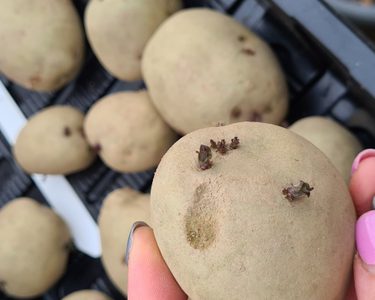How do you choose your potato varieties?
Quality definitely rules over quantity for our members when it comes to potatoes. Nearly everyone we surveyed liked to choose a named variety rather than just settling for whatever was available. The top three most important attributes were flavour, texture and resistance to blight.
Blight is still very much on the radar for gardeners, and some participants even stated it was a wasted effort trying to grow blight susceptible varieties in their area. The importance of blight resistance depends very much on locality: warmer, wetter areas are hit harder (bad luck for the South West) and if you have more potato crops grown nearby, that also increases the risk.
Yield was far less important being fifth on the priority list, with most people trying to grow high-quality produce that tasted better than anything they could get from the shops.
Sourcing organic potato seed was a challenge for many, with a number of comments focusing on the restricted range of varieties readily available.
You can read the full report below.

Sourcing seed
We wanted to find out to what extent people bought seed potatoes or if they used other sources such as home-saved seed or even shop-bought potatoes.
A total of 94 per cent of people bought seed potatoes, but 20 per cent also saved their own. Only eight per cent used shop-bought potatoes.
The advice to use seed potatoes, is not given to boost the profits of gardening catalogues but to minimise the spread of potato diseases. Seed potatoes are not just small-sized potato tubers, they've been grown under carefully managed conditions from disease-free stock in isolated locations to minimise the spread of viral and fungal diseases.
Repeatedly saving your own seeds of potatoes is not a recommended practice as there's a strong risk they'll become infected with diseases, especially viruses that are carried between locations by aphids. This not only infects your own crops in subsequent years, but your crops will be acting as a reservoir that will infect other people’s potatoes in the locality.
Organic seed and varieties
Just over half of our participants (57 per cent) stated they would buy organic seed when it was available, with only 19 per cent stating they would only buy organic seed.
A number of people commented that the choice of organic varieties was restricted, so many would not be prepared to sacrifice their favourite choice of variety in order to obtain organic seed. Being able to grow a specific variety was an important factor with 95 per cent stating they liked to choose a specific variety as opposed to growing whatever was available.
Potato attributes
Flavour was by far the most important factor for choosing a particular potato variety, with 99 per cent of participants stating this was either 'important' or 'very important'. Texture was also important to 80 per cent of people, choosing specific varieties with floury or waxy flesh for specific culinary use.
Areas with a lot of potato crops around tend to have higher incidence of blight. Some would take their chance by mixing and matching a few older varieties with preferred flavour with more modern varieties with better resistance. Storage was important to just under two thirds of participants, although a good number only grew early varieties, either though preference or specifically to avoid blight.
Yield was lower down on the priority list, with most people growing for flavour and quality rather than volume. One person stated that they had didn’t want to grow varieties that you could buy in large quantities cheaply in the shop.
Slug resistance was important to over half our participants. The importance of this depends on climate and soil type. One person commented that the varieties that claimed good slug resistance usually had thicker skins.
Early maturity was only important to a minority, although it was mentioned a few times in the comments as being a desirable characteristic, especially for those growing in blight susceptible areas. Lastly, having a well-respected name was important to less than a third of participants, although one person lamented the disappearance of older varieties that had better flavour.